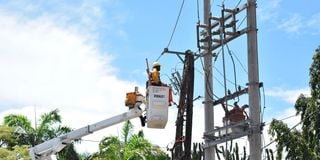IMF's hand in KPC, Kenya Power's venture into internet business

Kenya Power personnel from the Live Line Team attend to a power issue at Pandya Hospital on November 10, 2022. Kenya Power is piloting special utility poles to supply high-speed internet as part of plans to diversify its revenue.
State-owned utilities in the energy sector are in a race against time to diversify their revenue base as the spotlight shines brighter on them in the quest for commercial viability.
The restructuring of state-owned enterprises in the energy sector is a key pillar of Kenya's ongoing programme with the International Monetary Fund (IMF), with the list including entities such as the sole electricity distributor, Kenya Power, as well as power generator Kengen.
Kenya Power has announced plans to install smart poles to deliver high-speed internet as it seeks to generate more revenue from the growing demand for internet amid a slump in electricity revenues. Kenya Power is the second utility in the power sector after Kenya Pipeline Company (KPC) to foray into the internet market as demand for the service soars, while Kengen is increasingly becoming the go-to company for other African countries looking to tap into their geothermal potential, notably Ethiopia, Djibouti and Rwanda.
Kenya Power and KPC are keen to promote the last mile version of internet connectivity by leasing their vast network to telecoms companies.
"With our extensive network and fibre capacity, we intend to provide infrastructure for internet connectivity to public institutions such as schools and hospitals at a reasonable cost," said Kenya Power CEO Joseph Siror.
Kenya Power is piloting the project with Safaricom in Nairobi and once completed, it will be rolled out across Kenya for other telecom operators to lease and install their wireless transmission equipment.
Currently, Kenya Power leases fibre optic cables attached to its transmission lines to internet service providers.
Single-mode fibre
KPC, the state agency tasked with transporting and storing imported fuel, last year rolled out the single-mode fibre, which runs alongside the pipeline from the Kipevu oil terminal in Mombasa to Kisumu via Nairobi and Eldoret. The company is charging Sh3,069 ($22) per kilometre plus an installation fee of Sh27,900 ($200) per site for telcos interested in using its network, with contracts of five, ten, 15, 20 and 25 years.
Kenya Power's fees have not been undisclosed.
Increasing competition, pitting Safaricom against Airtel, Telkom Kenya and others in the Internet-only services market, provides Kenya Power and KPC with a huge boost in their revenue diversification drive.
While Kenya Power and KPC are tapping into their vast power and oil supply networks across the country, Kengen is riding on its status as a continental leader in geothermal power generation.
Since 2019, KenGen has secured deals worth an estimated Sh14 billion to drill geothermal wells in Ethiopia and Djibouti.
The company has started drilling three geothermal wells in Djibouti under a Sh709 million deal, two years after it successfully completed its seventh well in neighbouring Ethiopia under contracts worth Sh13.4 billion.
"The company is seeking to generate new revenue streams by offering commercial drilling services, geothermal consultancy and other related services across Africa," Kengen said at the completion of the seventh well in Ethiopia.
The revenue that Kenya Power and KPC are earning from the fibre business remains undisclosed, but Kengen is raking in billions that are key to bolstering its books and ensuring billions in dividend payouts to investors and the Treasury.





